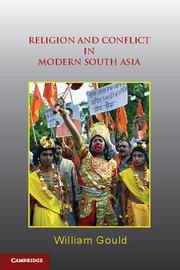Book contents
- Frontmatter
- Contents
- Abbreviations
- Glossary
- Acknowledgements
- 1 Introduction
- 2 Building Spheres of Community
- 3 Transforming Spheres of Community
- 4 Defining Spheres of Community
- 5 State Transformation, Democracy and Conflict
- 6 Forging National Consensus and Containing Pluralism
- 7 New Conflicts and Old Rivalries
- 8 The Resurgence of Communalism?
- Conclusion
- Bibliography
- Index
- References
5 - State Transformation, Democracy and Conflict
High Politics and the Everyday in the 1940s
Published online by Cambridge University Press: 05 June 2012
- Frontmatter
- Contents
- Abbreviations
- Glossary
- Acknowledgements
- 1 Introduction
- 2 Building Spheres of Community
- 3 Transforming Spheres of Community
- 4 Defining Spheres of Community
- 5 State Transformation, Democracy and Conflict
- 6 Forging National Consensus and Containing Pluralism
- 7 New Conflicts and Old Rivalries
- 8 The Resurgence of Communalism?
- Conclusion
- Bibliography
- Index
- References
Summary
Between 1948 and 1950, Mridula Sarabhai, a Gujarati Congress leader, sent a series of reports to Jawaharlal Nehru on the violence following India’s partition in the summer of 1947, the fate of refugees in camps, the problem of housing in Muslim areas of Delhi and, most importantly, the problem of female abduction. Her letters and reports illustrated, often in graphic detail, the involvement of not only civilians but also of specific government servants, policemen, army personnel and local politicians in the perpetuation and encouragement of violence. In late October 1948, she conducted a fact-finding tour of the Agra area in western UP and Dholepur State (in present-day eastern Rajasthan) – an area close to some of the worst instances of violence and with a considerable urban Muslim population – with Inspector Hans Raj of the Intelligence Bureau. Sarabhai and Hans Raj met the Principal of the Holman Institute in Agra, who passed on some information about the alleged location of women abducted from across the border. According to Sarabhai’s informant, at Deeg, twenty-five miles from Bharatpur, it was rumoured that there were two or three abducted Muslim women in every house. In Dholepur, in Bari, abducted women were also allegedly being kept in a big forest called Dang. A headman of fifty villages in Bari, said to be ‘working against the Congress’, also allegedly knew about them. Sarabhai’s information was that a gang of people, including policemen – thanedars and a city kotwal – were reportedly abducting Muslim women who had taken refuge from violence or who had been previously kidnapped from villages all over Dholepur state. These women were brought to Delhi and sold. Sarabhai’s informant went on to suggest that ‘Delhi people should be used’ to conduct an enquiry because the state people and police would be of no use.
This episode illustrated how, around India’s partition, reporting on Hindu–Muslim conflict was highly dependent on local context, but also that state acquiescence or the involvement of government servants and policemen often formed a part of the rumour surrounding such events. Sarabhai had her doubts about the veracity of the reports in this case and many others, and suggested herself that speculation about the actions of individuals in positions of authority was also part of the continuing ‘atmosphere of violence’. Also significant were the national and parliamentary debates underpinning Sarabhai’s fact-finding tours. The issue of ‘abducted’ women and their recovery was highly emotive and, as we will see, entered national debates about religion, Indian secularism and the role of state institutions in legislating for the Indian family. The image of the abducted Hindu woman took on a heightened symbolic significance around partition, which simplified and homogenised much more complex realities. In other reports, Sarabhai expressed surprise that women ‘reclaimed’ from abduction often had no intention of returning to their families and sought instead to start a new life on their own. These episodes also illustrated, crucially, that the implications of the partition violence stretched well beyond the moments of independence and the political concerns of the main political parties involved: the displacement or division of families or the loss of relatives caused long-term damage, with extremely complex implications for the social lives of those involved. And the violence of partition, particularly in its effects on those whose new national identity or sense of belonging was in doubt, extended into the early 1950s and beyond.
- Type
- Chapter
- Information
- Religion and Conflict in Modern South Asia , pp. 163 - 194Publisher: Cambridge University PressPrint publication year: 2011



